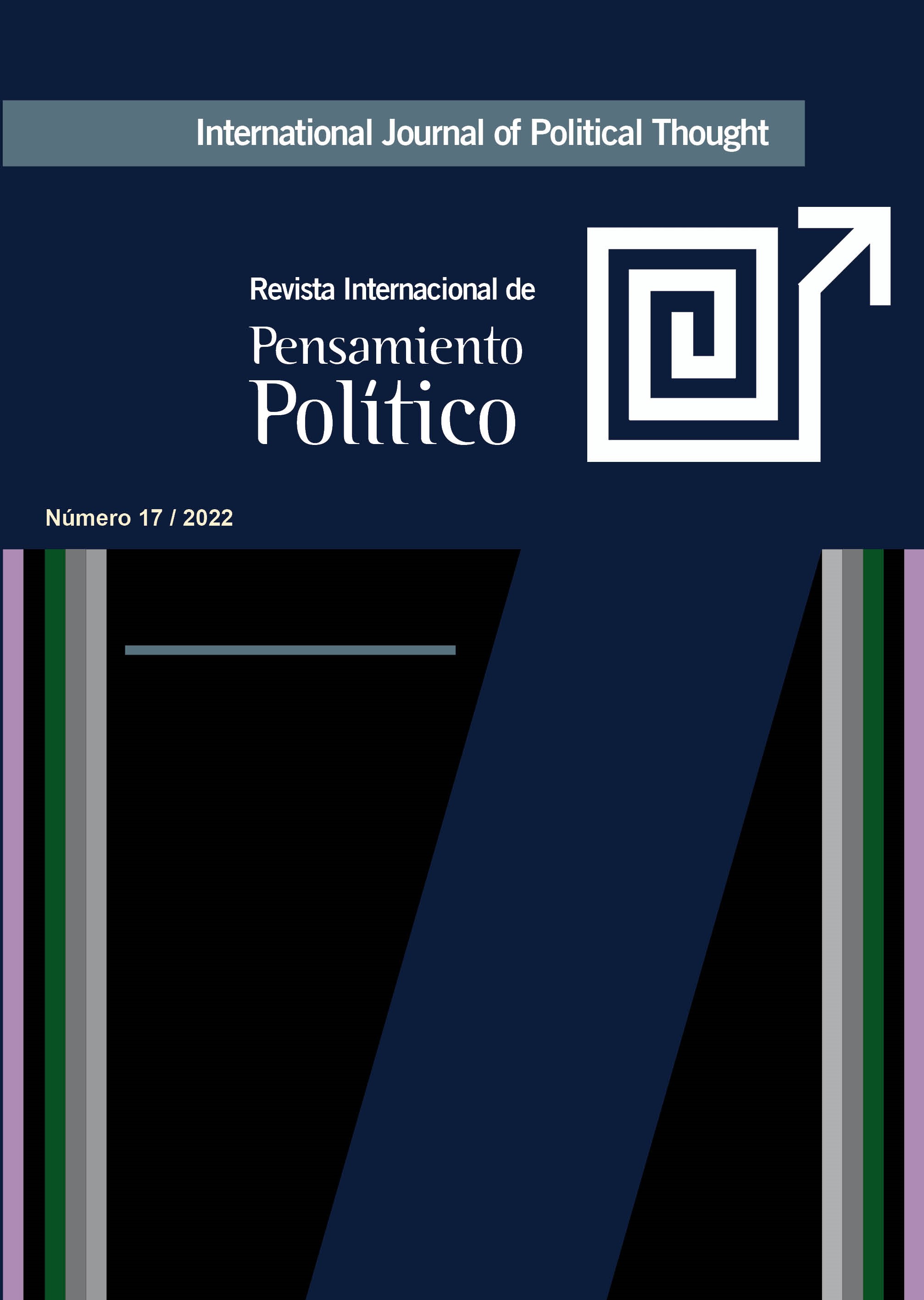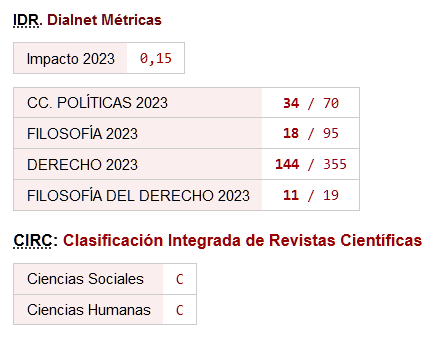The Aporias of a Disenchanted Representation
A Comparative Approach to the Concept of the Sovereign in Max Weber and Carl Schmitt
DOI:
https://doi.org/10.46661/revintpensampolit.7434Keywords:
Sovereignty, Political order, disenchaintment, representation, Weber, SchmittAbstract
Since Hobbes, the theorization of the personal sovereign within the political order as a denatured representative instance has been conflictive. This study aims to address that problem in the work of Max Weber and Carl Schmitt, who, parting from a diagnosis of modernity as disenchantment of the world, display opposing conceptions of political representation and democracy which grant a major role to the sovereign as the last ratio of order before the democratization of the State. In the light of two historical-anthropological conceptions of domination, three crucial aporias are detected in this propositive transition to understand the relationship between both authors: how to personify the impersonal domination of the modern State, how to accommodate plurality in a disenchanted political order and how to deal with the ethical relationship between ends and means in politics. On one hand, Weber proposes a republican form in which the president, supported by the masses in a plebiscite, acts by consolidating the legal-rational legitimacy of the democratic regime through his charisma. On the other hand, Schmitt theorizes a form of representation inspired by the Catholic Church, in which the sovereign acts as a decision-maker in the political sphere in exceptional cases and to a greater extent, as a catalyst for the total identification of the people with the State under the distinction friend- enemy.
Downloads
References
Abellán, J. (2019). Estado y soberanía. Madrid: Alianza.
Bobbio, N. (1991). Thomas Hobbes. Barcelona: Paradigma.
Brown, W. (2015). Estados amurallados, soberanía en declive. Barcelona: Herder. https://doi.org/10.2307/j.ctvt9k3g2
Dardot, P., & Laval, C. (2021). Dominar: un estudio sobre la soberanía del Estado en Occidente. Barcelona: Gedisa.
Domènech, A. (2019). El eclipse de la fraternidad. Madrid: Akal.
Galli, C. (2010). La mirada de Jano. México D.F: Fondo de Cultura Económica.
Hennis, W. (1983). El problema central de Max Weber. Revista de Estudios Políticos, (33), 49-100.
Herrera, C. M. (2008). La herencia weberiana en la República de Weimar. Res publica.
Hobbes, T. (1992). Leviatán. México D.F: Fondo de Cultura Económica.
Merino, J.L. (2022). El Leviatán en la doctrina del Estado de Carl Schmitt. Entre la crítica y la tragedia. Res publica, 25(2), 155-164. https://doi.org/10.5209/rpub.78722
McCormick, J. P. (1997). Carl Schmitt's Critique of Liberalism: Against Politics as Technology. Cambridge: Cambridge University Press. https://doi.org/10.1017/CBO9780511608988
Mommsen, W. (1990). Max Weber and German Politics, 1890-1920. Chicago: University of Chicago Press.
Rousseau, J.-J. (1980). Del contrato social. Discurso sobre las ciencias y las artes. Discurso sobre el origen de la desigualdad entre los hombres. Madrid: Alianza.
Schluchter, W. (2017). El desencantamiento del mundo. Seis estudios sobre Max Weber. Bogotá: Fondo de Cultura Económica.
Schmitt, C. (1971). Legalidad y legitimidad. Madrid: Aguilar.
Schmitt, C. (1990). Sobre el parlamentarismo. Madrid: Tecnos.
Schmitt, C. (1996). Sobre los tres modos de pensar la ciencia jurídica. Madrid: Tecnos.
Schmitt, C. (2000). Catolicismo y forma política. Madrid: Tecnos.
Schmitt, C. (2003). El Leviatán en la teoría del Estado de Thomas Hobbes. Granada: Comares.
Schmitt, C. (2009a). El concepto de lo político. Madrid: Alianza.
Schmitt, C. (2009b). La era de las neutralizaciones y las despolitizaciones. En C. Schmitt, El concepto de lo político (págs. 107-123). Madrid: Alianza.
Schmitt, C. (2009c). Teología Política. Madrid: Trotta.
Sieyès, E. (1994). ¿Qué es el Tercer estado? y Ensayo sobre los privilegios. Madrid: Alianza.
Skinner, Q. (2020). La llibertat abans del liberalisme. Girona: Edicions de la ela geminada.
Strauss, L. (2008). Comentario sobre El concepto de lo político. En H. Meier, Carl Schmitt, Leo Strauss y "El concepto de lo político": sobre un diálogo entre ausentes (Vol. 3040). Buenos Aires: Katz Editores. https://doi.org/10.2307/j.ctvm7bdm9.5
Villacañas, J. L. (1999). Crítica de la teología política. En M. Cruz, Los filósofos y la política. México D.F: Fondo de Cultura Económica.
Villacañas, J. L. (2005). Max Weber entre liberalismo y republicanismo. Isegoría, (33), 127-141. https://doi.org/10.3989/isegoria.2005.i33.421
Villacañas, J. L. (2008). Poder y conflicto: ensayos sobre Carl Schmitt. Madrid: Biblioteca Nueva.
Villacañas, J. L. (2020). Weber y Schmitt sobre Weimar: la legitimidad de una continuidad. En J. L. Villacañas, & J. Maiso, Laboratorio Weimar: la crisis de la globalización en Euroamérica (1918-1933) (págs. 69-110). Madrid: Tecnos.
Villacañas, J. L., & Maiso, J. (2020). Laboratorio Weimar: la crisis de la globalización en Euroamérica (1918-1933). Madrid: Tecnos.
Weber, M. (1982). La futura forma institucional de Alemania. En M. Weber, Escritos Políticos II (págs. 253-294). México D.F: Fondo de Cultura Económica.
Weber, M. (1986). Excurso. Teoría de los estadios y de las direcciones de rechazo religioso del mundo. En M. Weber, Ensayos sobre sociología de la religión I. Barcelona: Taurus.
Weber, M. (2002). Economía y Sociedad. Madrid: Fondo de Cultura Económica.
Weber, M. (2004). La ética protestante y el espíritu del capitalismo. Madrid: Alianza.
Weber, M. (2008). Escritos Políticos. Madrid: Alianza.
Weber, M. (2015). El político y el científico. Madrid: Alianza.
Weber, M. (2020). Sociología del poder. Madrid: Alianza.
Downloads
Published
How to Cite
Issue
Section
License
Copyright (c) 2022 Lorién Gómez Solano

This work is licensed under a Creative Commons Attribution-NonCommercial-ShareAlike 4.0 International License.
Open access policy
Free and open access is allowed to any interested party to all the contents of the journal issues, free of charge, being able to print and transfer all the articles, with the only condition of specifying the source and authorship.
The journal: a) does not charge authorship costs for the processing of articles or for their submission, b) maintains copyright for authors without restrictions, c) facilitates authors to keep their publication rights without limitations.
The International Journal of Political Thought is an original work of the Laboratory of Political Ideas and Practices of the Pablo de Olavide University. All articles included in the Journal are original work of their respective authors. This Journal is freely offered to the scientific and academic community at no cost and releases the contents according to the license "Attribution-NonCommercial-ShareAlike 4.0 CC BY-NC-SA" of the Creative Commons project available in the following url: https://creativecommons.org/licenses/by-nc-sa/4.0/legalcode
If you wish to translate or compile any of the articles available here, please contact us at contacto












 ISSN: 1885-589X
ISSN: 1885-589X  Universidad Pablo de Olavide
Universidad Pablo de Olavide